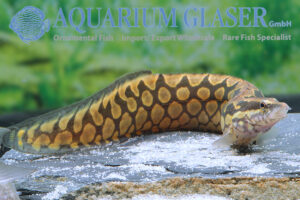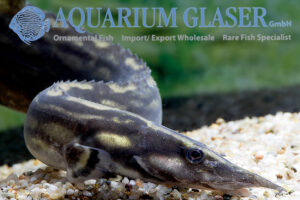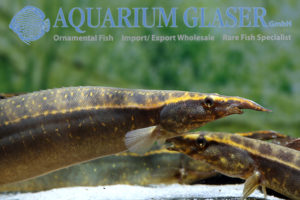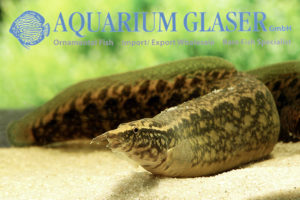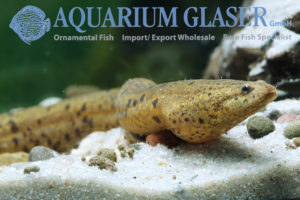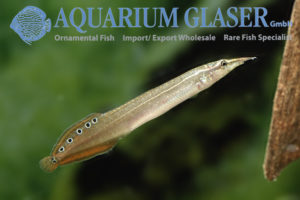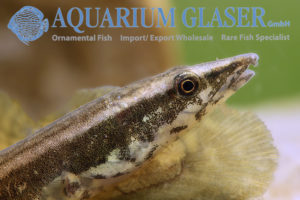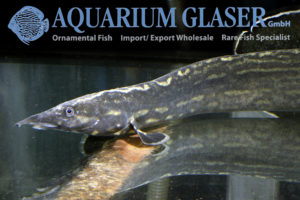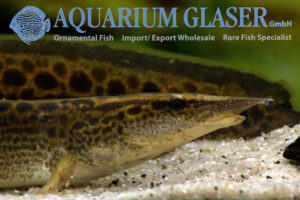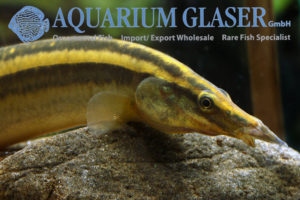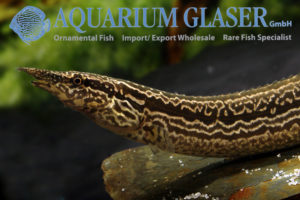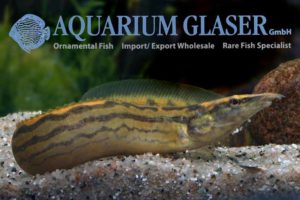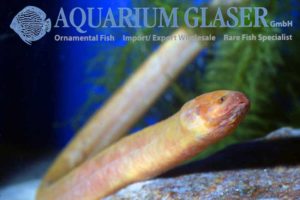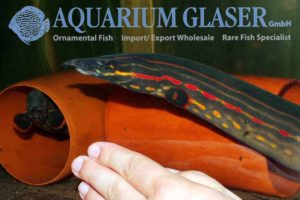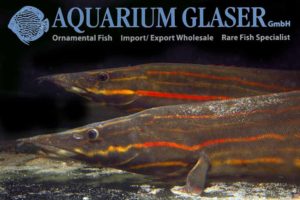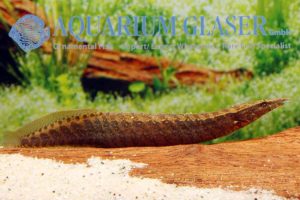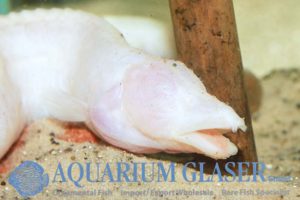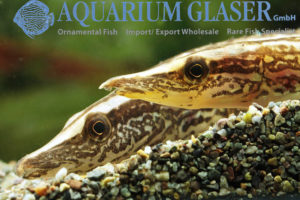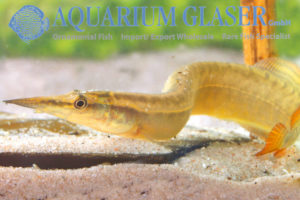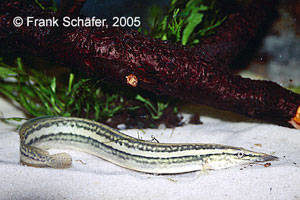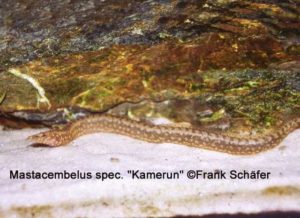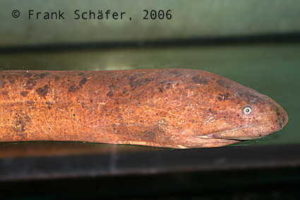The large spiny eels of the Mastacembelus armatus complex are found practically throughout South and Southeast Asia. Within this huge distribution area very differently patterned animals occur. Some of them have been scientifically described as independent species, such as the very strikingly colored spiny eel with the large, circular spots on its flanks. It was […]
22. Spiny eels (23)
-
-
Mastacembelus unicolor
Some time ago we were able to introduce you to the large, magnificent Mastacembelus unicolor, which was sent to us by mistake as M. erythrotaenia (see https://www.aquariumglaser.de/en/22-spiny-eels/mastacembelus-unicolor-2/). The animals at that time were too large for the photo aquarium, so we were only able to take photos from the regular sales tank. Now we have […]
-
Macrognathus aculeatus “Bangka”
The small spiny eel Macrognathus aculeatus – the species rarely grows to 20 cm long, even though 38 cm is given as the maximum length in the literature – is one of the longest known species of these bizarre fishes. Already in 1786 it was described by Bloch. As so often with old known species […]
-
Macrognathus maculatus
Spiny eels enjoy an increasing popularity. More and more aquarists are discovering that it is not always the colorful, constantly visible fish that are fun to watch, but also the more hidden fish personalities that are often only seen when feeding. Among these fish personalities are definitely the spiny eels. There are spiny eels in […]
-
Synbranchus marmoratus
Only very rarely marbled swamp eels from South America are available. After a quite long time we now have a number of juveniles from Peru in stock. The species attains a maximum length of about 1.5 m. These very large individuals are always males, because swamp eels change their sex. Most of them are born […]
-
Macrognathus siamensis Red Tail
At the moment we can once again offer very beautiful – i.e. strongly colored – offsprings of a dwarf spiny eel, which is not yet precisely identified. It is offered under the name Macrognathus aculeatus, but for various reasons it will probably not be this species. It shows the most similarity to Macrognathus siamensis, because […]
-
Sinobdella sinensis
For the first time we have obtained this highly interesting, small spiny eel. The species rarely grows larger than 20 cm and inhabits China and parts of Vietnam. According to its origin, care in unheated aquariums is recommended. In Sinobdella the dorsal, caudal and anal fins are fused together, in Asian spiny eels this is […]
-
Mastacembelus unicolor
We import the beautiful fire eel, Mastacembelus erythrotaenia, on a regular basis from Indonesia, usually large specimens, 30-60 cm long. These fish are about as thick as a forearm. Most recently we obtained again four specimens, 50-60 cm long. However, two of them looked totally different. They lack completely the red stripes and spots which […]
-
Mastacembelus pantherinus
Once more we were able to import an extemely rarely offered species of spiny eel, namely Mastacembelus pantherinus. In the internet this species is in general named M. dayi, but M. dayi has recently proofed to by a synonym of M. alboguttatus. Researcher Ralf Britz – he described, by the way, also M. pantherinus – […]
-
Macrognathus aculeatus
Once more we obtained from India (Bengal) wonderful Eyespot Spiny Eels. The fish are of adult size and 12-15 cm long. The only complicated thing in this species is the scientific naming. The Eyespot Spiny Eel attains a maximum length of about 20 cm and ist one of the most colourful species of all spiny […]
-
Mastacembelus sp. „Nargis“
We could import this new discovery – a spiny eel – for the first time now from Burma. Initially I thought it would be a member of the M.-armatus-group, but the specialist for spiny eels, Ralf Britz from Natural History Museum in London led me to the idea to take a closer look on the […]
-
Mastacembelus tinwini
Sadly we can offer this beautiful species of spiny eel only very rarely. The species has been described scientifically quite recently. It is a close relative of the common spiny eel of Asia, Mastacembelus armatus. Like that species, M. tinwini reaches a length of about 40 cm. Other fish are ignored if they are large […]
-
Monopterus albinus
The swamp- or rice-eels are strange-looking fish that become around 75 cm long. In their natural habitat they live deeply burrowed in the mud. These fish can survive even in almost oxygen-free water, because they own a lung that enables them to breath atmospheric air they take from the water surface. Swamp-eels are predators that […]
-
Mastacembelus erythrotaenia 40-45 cm arrived
We received gorgeous, 40-45 cm long Fire Spiny Eels. These fish are real personalities and additionally they have splendid colours! As an exception we have included the photographer´s hand and fingertip in the pictures to give you an idea how large the fish really are. For our customers: the animals have code 426509 on our […]
-
Mastacembelus erythrotaenia
We do not have only one of the smallest species of spiny eel in stock, eg M. taeniagaster, but also one of the largest: Mastacembelus erythrotaenia. These splendid guys reach us from Indonesia and are real personalities for the owners of large tanks. The largest known specimen was about 1 m long. Currently we have […]
-
Macrognathus taeniagaster
Basically speaking, the spiny eels of Asia can be divided in two groups: the small species belonging to the genus Macrognathus that reach usually only 10-15 cm total length and the large species of the genus Mastacembelus that grow to a length of more than 40 cm (maximum length reported: 100 cm). We received a […]
-
Caecomastacembelus brichardi
One expects blind species of fish from cave systems or the deep sea. But in the rapids of the lower Congo river not less than 5 different species of blind fish exist (among them the only blind species of cichlid of the World, Lamprologus lethops) – and nobody can explain why these fish are blind. […]
-
Mastacembelus caudiocellatus
Recently we were able to import this pretty spiny eel from Burma for the first time. It is a rather small (around 20 cm) species with a very contrasting pattern. The species lives endemically in the Lake Inle region in Burma. Lake Inle has medium hard water with a slightly alcalic pH. From Lake Inle […]
-
Macrognathus meklongensis
We were able to import for the first time one of the smallest and most beautiful species of spiny eel: Macrognathus meklongensis from Thailand.This charming species becomes hardly 15 cm long and only as thick as a forefinger. The coloration differs very much depending on mood. The basic colour is a nice golden bonze, the […]
-
Macrognathus aral
This spiny eel originates from South East Asia, i.e. Pakistan, India, Sri Lanka, Bangladesh, Nepal up to Myanmar in their most southern distribution area. This fish is dawn and night active and will eat small fish. Therefore it should only be kept with larger tank fellows. In their natural habitat this species can reach a […]
-
Mastacembelus greshoffi
Some time ago we could import Mastacembelus greshoffi from the Congo. Here we have a spiny eel getting approximately 35 cm long, which occurs over rocky bottoms in rivers and lakes, also in rapids. Spiny eels are intelligent fish, they show a multiplicity of interesting behaviours. They also can become amazing tame and eat then […]
-
Mastacembelus spec. „Kamerun“
This spiny eel reached us from Cameroon. The classification to a species was so far not possible for us. Since spiny eels predominantly are found on sandy to muddy bottom, they require a sand substrate in which to dig and hide. Flat rocks are also good for these fish to burrow under; just make sure […]
-
Synbranchus marmoratus
As a beauty in the conventional sense Synbranchus marmoratus can not be chracterised, but even the extraordinary has its attraction. At the moment we can offer beside swamp eels in „normal“ sizes a giant of approximately 1 m length. Of course a predator of this size should not be kept together with small „food fishes […]





